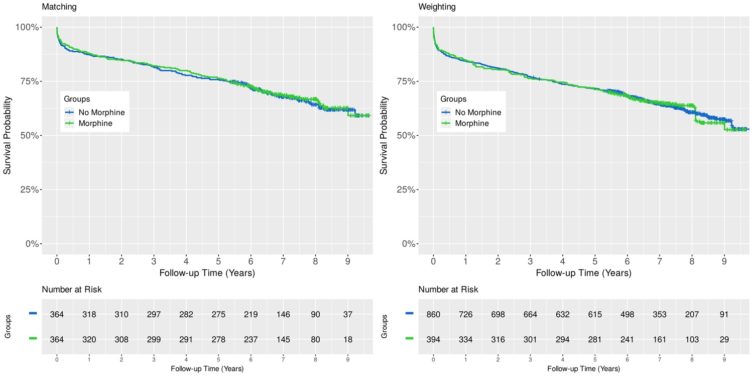Morphine may be used safely in patients with myocardial infarction treated with coronary intervention
 A sudden blockage of one of the coronary arteries providing blood supply to the heart causes myocardial infarction, which is most often indicated by an ECG abnormality (an increase in the ST stage). In such cases, the immediate implantation of a metal stent into the vessel increases the chance of survival and avoids severe consequences. Medication that inhibits platelet aggregation is essential to keep the vessel permanently open. However, its laboratory efficacy is inhibited by morphine, which is often needed to combat pain associated with the disease, fear of death, and pulmonary congestion. The latter may also lead to an increase in the size of the dead myocardial area and increase mortality.
A sudden blockage of one of the coronary arteries providing blood supply to the heart causes myocardial infarction, which is most often indicated by an ECG abnormality (an increase in the ST stage). In such cases, the immediate implantation of a metal stent into the vessel increases the chance of survival and avoids severe consequences. Medication that inhibits platelet aggregation is essential to keep the vessel permanently open. However, its laboratory efficacy is inhibited by morphine, which is often needed to combat pain associated with the disease, fear of death, and pulmonary congestion. The latter may also lead to an increase in the size of the dead myocardial area and increase mortality.
According to Dr. István Hizoh, assistant professor at the Department of Cardiology of Semmelweis University and Dr. Dominika Domokos, clinical specialist and PhD student at the Heart and Vascular Centre, little data is available on the actual role of this laboratory drug interaction in survival. In their registry study, they followed 1,255 patients treated with percutaneous coronary intervention (PCI) for an average of 7.5 years. After eliminating the bias due to the nature of the method, their results revealed that the survival of patients treated with intravenous morphine and those not receiving intravenous morphine did not show difference. This suggests that intravenous morphine may also be safely used to treat pain, fear of death, and pulmonary congestion in patients with myocardial infarction undergoing invasive treatment.
Impact of periprocedural morphine use on mortality in STEMI patients treated with primary PCI.
Domokos D, Szabo A, Banhegyi G, Major L, Kiss RG, Becker D, Edes IF, Ruzsa Z, Merkely B, Hizoh I.
PLoS One 2021;16:e0245433 https://doi.org/10.1371/journal.pone.0245433
In accordance with the terms of the International License of Creative Commons Creative Commons Attribution-NonCommercial-NoDerivatives 4.0 International (https://creativecommons.org/licenses/by-nc-nd/4.0/deed.hu)


